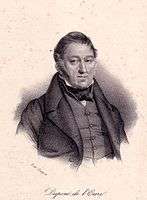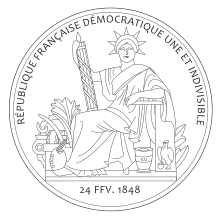French Provisional Government of 1848
| Provisional government of 1848 | |
|---|---|
|
cabinet of France | |
|
Jacques-Charles Dupont de l'Eure, President of the council | |
| Date formed | 24 February 1848 |
| Date dissolved | 9 May 1848 |
| People and organisations | |
| Head of government | Jacques-Charles Dupont de l'Eure |
| History | |
| Predecessor | Cabinet of François-Pierre Guizot |
| Successor | Executive Commission of 1848 |

The Provisional government was a short-lived government formed on 24 February 1848 at the start of the French Second Republic, after the Cabinet of François-Pierre Guizot and the July Monarchy had been thrown out of power. It was succeeded by the Executive Commission of 1848.
Formation
The Provisional Government was formed after three days of street fighting in Paris that ended in the abdication of King Louis Philippe I at noon on February 24. The leaders of the government were selected by acclamation in two different meetings later that day, one at the Chamber of Deputies and the other at the Hôtel de Ville. The first set of seven names, chosen at the Chamber of Deputies, came from the list of deputies made by the moderate republican paper Le National. The second set of names, chosen at the Hôtel de Ville, came from a list made by the more radical republican paper La Réforme. In addition to the first set of deputies it included three journalists and a representative of the workers. Later that evening the combined list was acclaimed at the Hôtel de Ville.[1]
The members of the new Provisional Government collectively acted as head of state. They included the former deputies Jacques-Charles Dupont de l'Eure, Alphonse de Lamartine, Adolphe Crémieux, François Arago, Alexandre Auguste Ledru-Rollin, Louis-Antoine Garnier-Pagès and Pierre Marie de Saint-Georges. The three journalists were Armand Marrast, Louis Blanc (a socialist) and Ferdinand Flocon. The representative of the workers was Alexandre Martin, known as "Albert".[1]
Ministers
Ministers were named to head the government ministries. The positions of power in the Provisional Government were mainly given to moderate republicans, although Étienne Arago was made Minister of Posts and Marc Caussidière became Prefect of Police. Alexandre Martin ("Albert"), Louis Blanc and Ferdinand Flocon did not get ministerial portfolios, and so had little power.[2] The ministers were:
| Ministry | Start | End | Minister | Sub-Secretary |
|---|---|---|---|---|
| President of the Council | 24 February 1848 | 9 May 1848 | Jacques-Charles Dupont de l'Eure | |
| Interior | 24 February 1848 | 9 May 1848 | Alexandre Auguste Ledru-Rollin | |
| Foreign Affairs | 24 February 1848 | 9 May 1848 | Alphonse de Lamartine | |
| Finance | 24 February 1848 | 5 March 1848 | Michel Goudchaux | |
| Finance | 5 March 1848 | 9 May 1848 | Louis-Antoine Garnier-Pagès | Charles Duclerc (from 23 March 1848) |
| Justice | 24 February 1848 | 11 May 1848 | Adolphe Crémieux | |
| Public Works | 24 February 1848 | 9 May 1848 | Pierre Marie de Saint-Georges | |
| Agriculture and Commerce | 24 February 1848 | 9 May 1848 | Eugène Bethmont | |
| Education and Religious Affairs | 24 February 1848 | 9 May 1848 | Hippolyte Carnot | |
| Navy and Colonies | 24 February 1848 | 9 May 1848 | François Arago | Victor Schœlcher (from 4 March 1848) |
| War | 25 February 1848 | 20 March 1848 | Jacques Gervais, baron Subervie | |
| War | 20 March 1848 | 5 April 1848 | Louis-Eugène Cavaignac | |
| War | 5 April 1848 | 9 May 1848 | François Arago |
Key events
| February 24: |
|
| 25: |
|
| 26: |
|
| 28: |
|
| 29: | |
| March 2: |
|
| 4: |
|
| 5: |
|
| 7: |
|
| 8: |
|
| 9: |
|
| 12: |
|
| 13-18: |
|
| 14: |
|
| 16: |
|
| 17: |
|
| 21: |
|
| 23: |
|
| 30: |
|
| April 3: | |
| 5: |
|
| 16: |
|
| 23: |
|
| 27-28: |
|
| 27: |
|
| 29: |
|
| May 4: | |
| 6: |
|
References
- 1 2 Luna 2004.
- ↑ Fortescue 2004, p. 70.
- ↑ Fortescue 2004, p. 63.
- ↑ Fortescue 2004, p. 64.
- ↑ Fortescue 2004, p. 64-65.
- ↑ Lamartine 1890, p. 17.
- 1 2 Agulhon 1983, p. 41.
- ↑ Fortescue 2004, p. 96.
- 1 2 Augello & Guidi 2005, p. 132.
- ↑ Agulhon 1983, p. 42.
- 1 2 Agulhon 1983, p. 47.
Sources
- Agulhon, Maurice (1 September 1983). The Republican Experiment, 1848-1852. Cambridge University Press. ISBN 978-0-521-28988-7. Retrieved 21 March 2014.
- Augello, Massimo M.; Guidi, Marco Enrico Luigi (1 January 2005). Economists in Parliament in the Liberal Age (1848-1920). Ashgate. ISBN 978-0-7546-3965-7. Retrieved 21 March 2014.
- Fortescue, William (2 August 2004). France and 1848: The End of Monarchy. Routledge. ISBN 978-1-134-37923-1. Retrieved 19 March 2014.
- Lamartine, Alphonse de (1890). Lamartine's works ... G. Bell & sons. Retrieved 21 March 2014.
- Luna, Frederick de (17 October 2004). "Provisional Government of the Second French Republic". Retrieved 2014-03-21.

